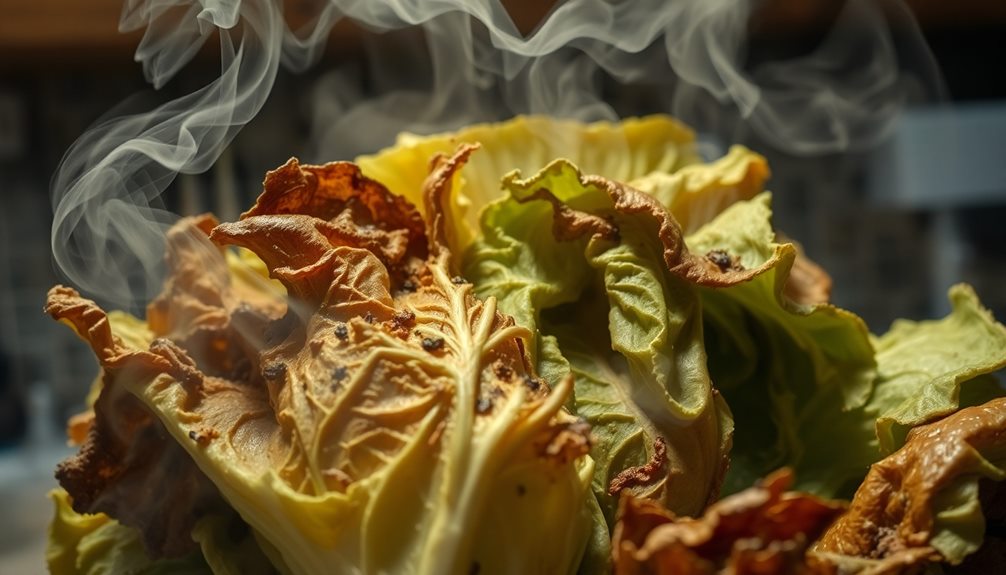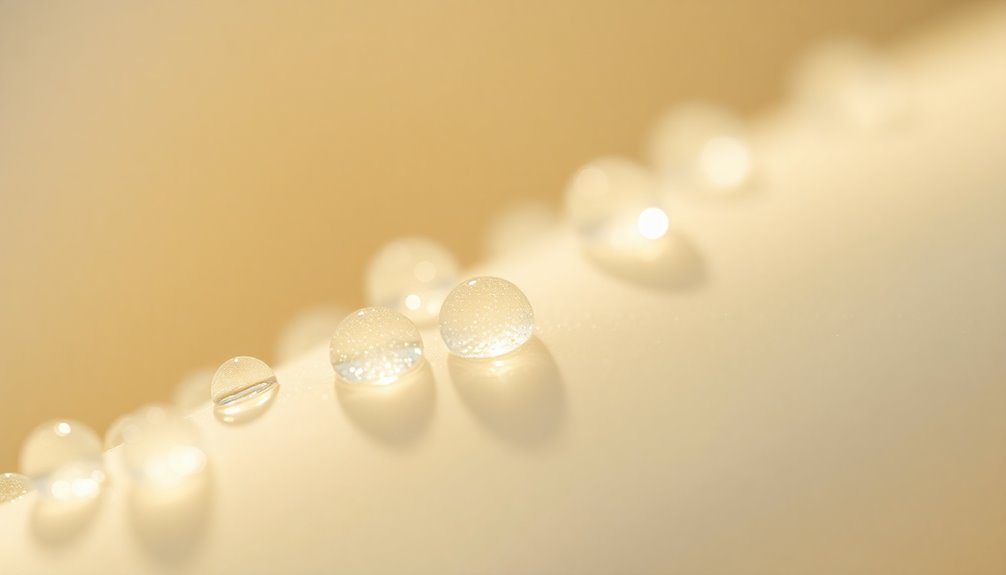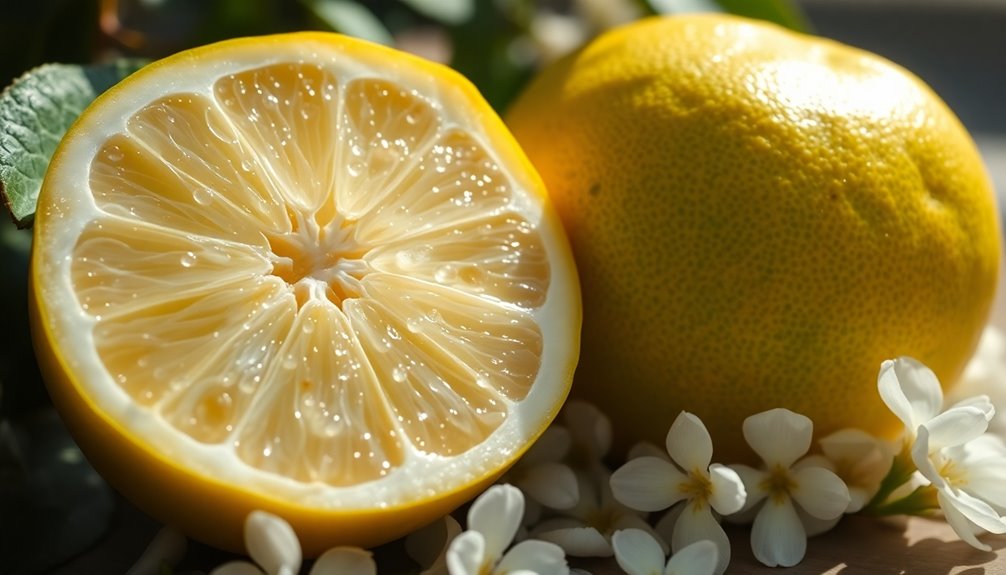A healthy vagina usually smells mild and earthy, not strong or sweet. You might notice a slightly tangy aroma, especially during your menstrual cycle, as hormones can change the scent. This natural odor comes from friendly bacteria called Lactobacilli, which help keep everything balanced. It's common for the smell to vary a bit, but if you notice anything really strong or fishy, it might be a sign to check in with a doctor. Remember, understanding your body's natural scents can help you feel more confident and healthy. Keep exploring, and you'll find out more about maintaining good vaginal health!
Key Takeaways
- A healthy vagina typically has a mild, earthy, or slightly tangy odor due to Lactobacilli bacteria maintaining a low pH.
- Odor varies throughout the menstrual cycle, influenced by hormonal changes, but should not be strong or unpleasant.
- Normal vaginal scents can include slightly sour or musky notes, while a coppery smell may occur during menstruation.
- Personal hygiene practices and diet can affect vaginal odor, with foods like garlic or onions potentially altering the scent.
- Significant changes in odor, particularly strong, fishy, or rotten smells, may indicate health issues and warrant medical evaluation.
Introduction

When it comes to vaginal health, understanding what a healthy vagina smells like is essential. Healthy vaginas typically have a mild odor, which can change throughout your menstrual cycle. This scent is influenced by your hormonal changes and the unique bacterial flora in your body.
A healthy vagina may give off tangy or slightly sour aromas, showing that lactobacilli bacteria are doing their job to maintain an acidic environment, protecting against harmful bacteria.
It's important to note that a healthy vaginal scent isn't floral or fruity; instead, it might be described as earthy. This reflects the natural balance of bacteria and pH levels in your vagina.
You might notice a coppery or metallic smell during your period due to blood, but this is usually normal unless it comes with unusual symptoms.
Being aware of your personal vaginal scent is crucial. If you notice significant changes or detect strong odors, it could signal potential health issues that may need medical attention.
Description of the Smell

Understanding the specifics of a healthy vaginal smell can help you recognize what's normal for your body. A healthy vagina typically has a mild musky odor that's not floral or fruity. Instead, it can range from earthy to slightly sour. The presence of Lactobacilli bacteria is key, as these good bacteria help create a balanced acidic environment and contribute to a tangy or fermented smell.
Keep in mind that vaginal odor can change throughout your menstrual cycle. Midcycle, for example, you might notice a stronger scent due to hormonal fluctuations.
It's also normal to detect a coppery scent during your period or light bleeding, particularly from menstrual blood. However, if you notice sweet or earthy odors, they can result from shifts in vaginal pH and bacterial composition.
Just be sure to monitor for unusual intensity or any accompanying symptoms, as these may signal an imbalance or infection.
Source and Composition

The source of a healthy vaginal smell primarily comes from the complex ecosystem of bacteria that inhabit the vagina, particularly Lactobacilli.
These friendly bacteria play a vital role in maintaining a healthy environment. They help keep the vagina's pH level low, creating an acidic environment that prevents the overgrowth of harmful bacteria. This balance is essential for a pleasant scent.
The unique smell of your vagina can vary. It might be described as earthy, slightly sour, or tangy, especially influenced by hormonal fluctuations throughout your menstrual cycle. This is perfectly normal and often influenced by factors such as diet, hygiene habits, and sexual activity. It’s important to understand that common vaginal odors explained in this way are typically not a cause for concern unless accompanied by symptoms like itching, burning, or unusual discharge. Keeping track of any sudden changes can help you identify if there’s an underlying issue that might require medical attention.
Your personal hygiene practices also affect this odor. Good hygiene helps maintain a healthy vaginal flora, while poor hygiene can lead to unpleasant smells.
Your diet plays a part too! Foods like garlic or onions can change how your vagina smells.
Regularly monitoring any changes and maintaining your vaginal health through proper hygiene is key. This way, you can ensure that your natural scent stays within the range of normal and healthy.
Typical Scenarios or Environments

Various scenarios can influence the natural scent of your vagina. A healthy vagina typically has a mild odor, often musky or slightly tangy. This scent can change throughout your menstrual cycle due to hormonal changes.
For example, during menstruation, you might notice a stronger smell because of increased moisture and pH level shifts. When you engage in physical activities or have intercourse, the scent may also become more pronounced.
The presence of lactobacilli bacteria is crucial for maintaining a healthy, acidic environment, contributing to that normal, fermented smell. Environmental factors play a role too—what you wear can affect your scent.
Opting for cotton underwear and practicing good hygiene helps keep things fresh. It's important to be aware of your typical scent patterns. If you notice sudden or persistent changes, it could signal a health issue that may require medical evaluation.
Keeping track of these variations can help you stay in tune with your body. By understanding these typical scenarios, you can better appreciate the natural scent of your healthy vagina and know when to seek help.
Emotional or Cultural Associations

Your perception of vaginal scent is often shaped by emotional and cultural factors that influence how you view your body. Many cultures have different ideas about vaginal odor, with some seeing it as a sign of cleanliness and femininity, while others might consider any odor as undesirable.
These societal norms can lead you to feel self-conscious about your natural scent, especially when media and advertising push unrealistic beauty standards.
Emotional associations with vaginal smell can also play a big role. Positive feelings about a healthy vaginal smell can boost your confidence and sense of empowerment, while negative associations may cause anxiety and shame about your body.
It's important to understand that a healthy vaginal smell is normal and natural.
Open conversations about feminine hygiene and normal vaginal odors can help challenge these stigmas. By embracing body positivity and recognizing that everyone's body is different, you can learn to feel more comfortable in your skin.
Health or Safety Considerations

Understanding the health and safety considerations surrounding vaginal odor is crucial for maintaining your well-being. A healthy vagina typically has a mild, earthy, or slightly tangy natural scent. This scent comes from the balance of bacteria in the vagina, especially Lactobacilli, which helps maintain proper pH levels.
During your menstrual cycle, you might notice changes in vaginal odor. It can become stronger mid-cycle due to hormonal shifts. While some variation is normal, a strong, fishy, or rotten smell can signal issues like bacterial vaginosis. If you experience these changes, it's essential to seek medical advice.
To support your vaginal health, proper hygiene is key. Wash the area with mild soap and water, and avoid douching, which can disrupt the natural bacterial balance.
Final Thoughts

Maintaining awareness of your body's natural scent is vital for overall vaginal health. A healthy vagina typically has a mild, slightly tangy odor, similar to fermented foods. This is due to Lactobacilli bacteria that help maintain an acidic pH balance. You might notice that normal vaginal scents vary throughout your menstrual cycle, often becoming more pronounced mid-cycle. However, they shouldn't smell strong or offensive.
It's essential to understand your personal odor patterns. Sweet or earthy scents can occur due to fluctuations in vaginal flora, but you should monitor any significant changes. If you notice sudden changes in your vaginal odor, it might signal health concerns that need attention.
Remember, a healthy vagina doesn't smell fresh or flowery; instead, it may have earthy or ripe undertones. If you experience persistent shifts in smell or any discomfort, don't hesitate to seek medical consultation. Your health is important, and being proactive about changes can lead to better outcomes.
Embrace your body's natural scents while taking care of your vaginal health, and you'll feel more confident and informed about what's normal for you!
Frequently Asked Questions
What Smells Are Healthy Down There?
When considering smells down there, you might notice mild, musky scents or tangy odors from healthy bacteria. Variations can occur due to your menstrual cycle, but anything strong or unusual should prompt a check-up.
What Is the Natural Smell of Vigina?
The natural smell of your vagina can be mild and earthy, sometimes slightly sour. It changes throughout your menstrual cycle, often becoming stronger around ovulation, reflecting your body's hormonal shifts and bacterial balance.
How Do I Make Sure I Smell Good Down There?
To smell good down there, you should wash regularly with mild soap, wear breathable cotton underwear, stay hydrated, avoid douching, and include probiotics in your diet for a balanced vaginal flora.
Does Female Arousal Have a Smell?
Yes, female arousal can have a unique smell due to increased blood flow and natural secretions. This scent varies among individuals, influenced by hormones, diet, and hygiene, so it's completely normal for it to change.









